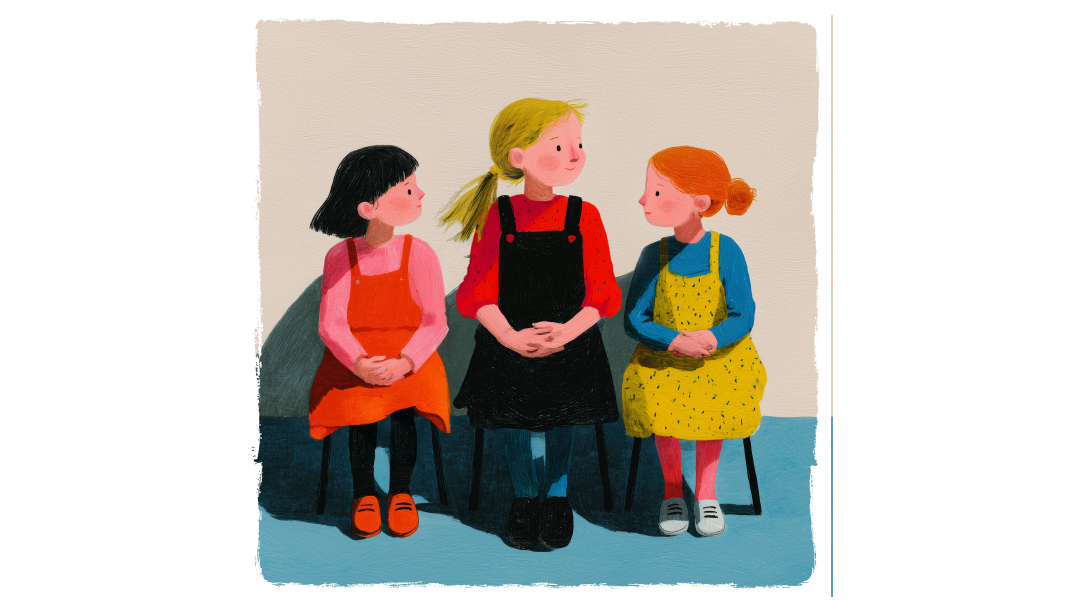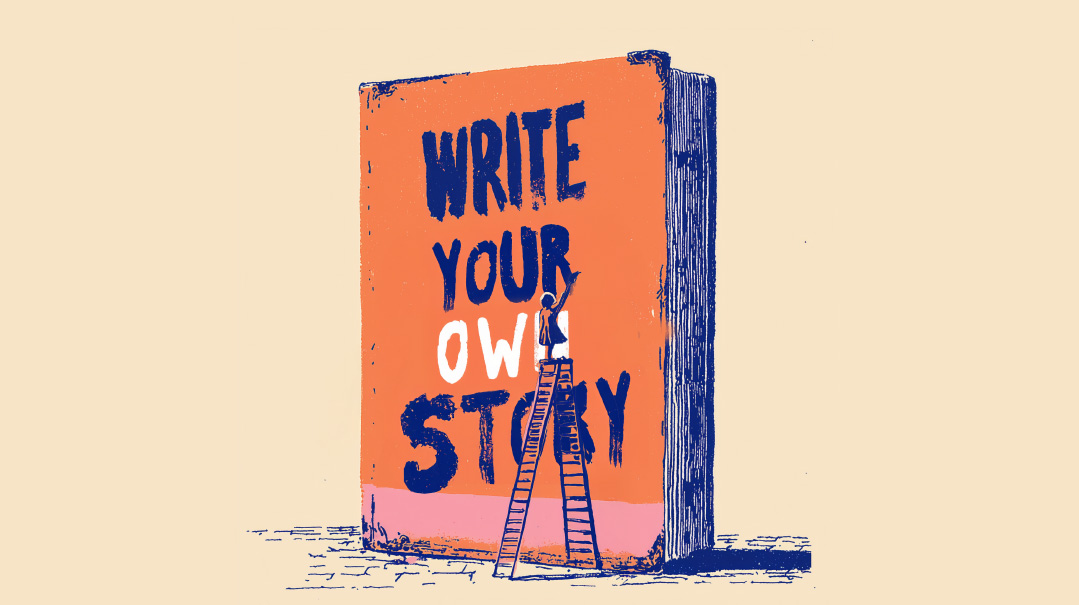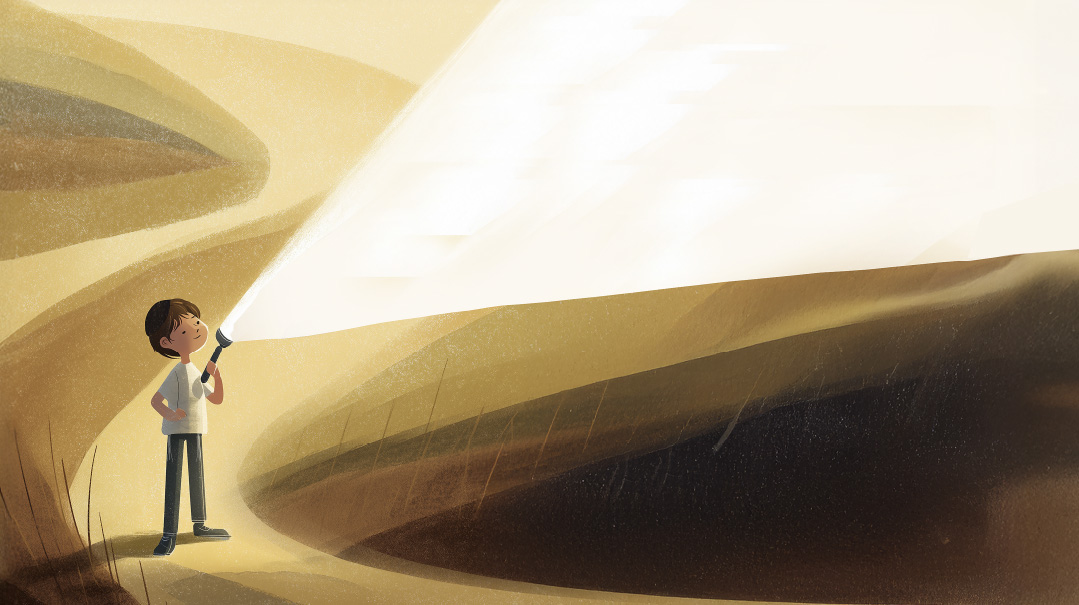Todah L’morah
| June 14, 2022As the school year comes to a close, 12 women tell us about the teachers who made a difference

She was there for you when you need it most
She opened up new worlds for you
She believed in you — and then you believed in yourself
As the school year comes to a close, 12 women tell us about the teachers who made a difference
Squeeze Out a Smile
Tzipora Schiffer
It’s over 20 years since Mrs. Yaffa Adler was my biology teacher in Bais Yaakov of Toronto, but I’m still holding on to the yellow smiley super balls she gave me.
I was a staff kid, so even before I got to high school, I knew that Mrs. Adler was a beloved, loving teacher. But then I experienced it myself.
I wasn’t an easy student. I was loud. It was hard for me to sit, and I always needed to be heard. I was constantly popping up, interjecting comments that were relevant… or not.
One day, my disruptions were too much, and Mrs. Adler sent me out of class, in the most neutral, non-punishing way possible. I definitely deserved it, and both the class and I needed a break from each other. But it stung.
The next day, Mrs. Adler appeared at the door with this little yellow ball in her hand. “I know that I made you sad by sending you out yesterday, so here’s something to make you happy.”
After a little while I lost the ball, but its message wasn’t lost on me, so I asked Mrs. Adler for another one. She happily gave me one. When I found the original one, it just made the whole thing more special.
Mrs. Adler did what she needed to do in order for the classroom to be able to function. But she made sure to let me know that I still mattered. That it hurt her to hurt me.
From Mrs. Adler I learned firsthand the power of unconditional positive regard from an adult in a child’s life. As I look at these balls today, a lump forms in my throat, and I remember that I’m a beloved child of Hashem, deserving of love and respect — a cherished message I pass on to my children and clients today.
Give Her a Chance
Aleeza Lebowitz, Ramat Beit Shemesh
I walked into my seminary, Midreshet Moriah, ready to party. Far away from parents with rules, and school with even more rules, I was thrilled to have achieved my long-awaited freedom.
Problem was, I’d forgotten to factor in the many classes and extracurricular activities my parents had paid thousands of dollars for me to be inspired by. No matter! I learned the fine art of rolling out of bed, throwing on my “Biz” skirt (remember those? Blue for everyday, black for special occasions), signing in for attendance, and diving back under the covers before my body really woke up.
All that sleeping left me time to explore the streets of Yerushalayim at night. At first it was the best restaurants and clubs in town, but even the most exciting nightlife eventually loses its excitement. I became intimately familiar with the best bakeries in the shuk and the best parks for falling asleep under a tree.
Eventually, though, the potent power of “avirah daaretz” worked its magic on me. It took time for me to understand what that yearning meant and to realize it was my thirsty neshamah. Never one to sit still, I went searching. I went to meditation seminars in Tzfas, learned Tanya in a Chabad seminary in Meah Shearim, and spent time doing hisbodedus in the Jerusalem forest. One thing I did not do: attend the incredible array of classes my seminary provided.
But there was one early morning class that my friends all raved about. And so even though I wasn’t one to join the masses, I decided to give Shemos with Dr. Bryna Levy a try.
To say that it was life changing is an understatement. I’d never seen the story of the Jews leaving Mitzrayim portrayed with such depth and emotion. Every class was full of drama, mystery, and intrigue, and left me breathless and wanting more. I delved deep and pushed myself to understand the Rashis, Rambans, and the nuances in the pshat. I left feeling invigorated and accomplished. (Unfortunately, my excitement didn’t spill over to attending other classes.)
The year passed, full of crazy chavayot and many DMCs. I fell in love with Eretz Yisrael and knew I wouldn’t continue to grow on American soil. I decided to stay a second year in seminary, with the support (and relief) of my parents. But when I made my intentions known to the administrators, they thought I was joking. “How can we let you stay?” “Your attendance is horrible!” “How can you be a role model to the younger grade?”
Only one voice told a different story. My beloved Chumash teacher begged them to give me a chance. She saw my passion and knew that with some guidance and structure, I could succeed.
They let me stay.
I’m still here — with my rabbi husband, our ten children, and on the cusp of starting a new seminary program. I daven to Hashem that I always find that potential in my own students. Because I know that the whole trajectory of my life changed in that one moment when my teacher saw potential that no one — not even me! — could envision.
Mrs. Grunberg Is Proud of Me
Chaya B., second grade
Mrs. Sarala Grunberg is my afternoon teacher at Joan Dachs Bais Yaakov in Chicago. She’s talented and very sweet and thoughtful and loving and caring. She thinks of me a lot. And I love her so much. She taught me a lot.
She is patient for every girl. She speaks sweetly every time she calls on a girl. She’s thoughtful when someone is sick or can’t come to school. When someone needs help, she has good ideas every time. She loves drawing pictures. She’s just such a good teacher.
I was a big troublemaker in the beginning of the year. Mrs. Grunberg gave me a chart. It really helped me.
I take medicine, and when I take the medicine every single day, I know inside that I can do well in school today. One time in school, I was not behaving at that moment, so Mrs. Grunberg told me to take a walk, and it helped a lot, and the rest of the day was good.
Baruch Hashem now I’m behaving in school. Hashem is helping me so much and He’s my Father and my King. He can help you in school when you need it. Daven to Him.
One time in school I was done with my work, and Mrs. Grunberg told me to help someone, and I did. I helped two girls. I felt proud of myself for the rest of the day.
I’m really proud of what I did in school. I behaved. Mrs. Grunberg is also proud of me.
Faith and Serenity
Three Sisters Who Were Inspired
AS any teacher at TAG High School can tell you, integrating a disparate group of ninth graders coming from different schools and backgrounds is no easy feat. But Morah Miriam Adler managed to teach and inspire all of us. While we may not remember many of the classroom lessons she shared, we gleaned life lessons from watching Morah Adler every day. Morah Adler breathed emunah and bitachon.
Over the years, Morah Adler shared how she remained single far longer than her friends. As her friends were making bar mitzvahs, she went on first dates. She’d tell us with total acceptance and clarity, how this was what Hashem wanted from her. Her lessons were infused with emunah peshutah, her infallible belief that Hashem has handpicked the perfect circumstances for each person.
Morah Adler did get married, and she raised a beautiful family. Her acceptance of Hashem’s Will constantly replays in our minds as we live life and face our own challenges. We ask ourselves, “How would Morah Adler respond to this challenge?”
A few years ago, Morah Adler was diagnosed with a devastating illness. She had young children who still needed their mother. Instead of becoming despondent, Morah Adler gifted us with her ultimate lesson: “This is what Hashem wants from me. We may not see how this is good right now, but it’s the best thing for me. If Hashem wants me to be healed, He can and will heal me, and if He doesn’t, then I am not meant to recover.”
Morah Adler ultimately passed away, leaving her young family bereft. Her lessons of emunah and bitachon carry us, her students, and the hundreds of others whose lives she touched. We remember her parting message far more clearly than the facts and dates we memorized in high school. Our lives and souls were forever changed by the way that Miriam Kayla bas Eliezer lived her life and how she left This World — with simple faith and serenity.
Miss Resnik Is Here!
Bayla Geberer
Social insecurities coupled with family responsibilities had brought me to a raw place, making tenth grade at Cleveland’s Bais Yaakov Mosdos my hardest year of high school. My one anchor? Miss Resnik. With calm patience and a focus I’d never quite experienced before, she supported me through that roller-coaster year of high school woes.
On this balmy spring night, our kitchen was already filled to capacity. My home had become a hub for seminary girls to hang out during their year of learning in the local seminary, and this Friday night was no different. My baby brother’s shalom zachor was the perfect opportunity for the girls to congregate. The stars glittered outside, and inside my house was humming with the joy a new life brings.
I was happy — and sad. I was so thankful for my new brother. But internally, I felt like my world was falling apart. Miss Resnik was no longer Miss Resnik. She was now Mrs. Kaufman, having gotten married just a few days before my new brother made his appearance. Miss Resnik was leaving me.
What would I do? Who would I talk to? How would I manage? Or, as teenage me would have put it: “How would I survive?”
And then I heard the whispers. “Miss Resnik is here!” “Miss Resnik is here!” My heart leapt to my throat. Could it really be true? Could she have really made the time to do this for me? With her brand-new husband? Do I really mean that much to her?
From my perspective now as a mother of my own teenage daughters, I honestly don’t remember if tenth grade improved much or not. But I’ll always remember just how much it meant to discover that yes, I really did mean that much to her.
The Handshake
Alise Gold, Chicago
A
handshake is usually formal and cordial, a sign of introduction or agreement. But with Mrs. Sarah Wainkrantz, a handshake symbolized much more.
I was first introduced to Mrs. Wainkrantz in ninth grade. I’d started a new school, Ida Crown Jewish Academy, with a new way of learning limudei kodesh, very different from the community school I previously attended. Mrs. Wainkrantz’s love and passion for Torah was impossible to miss and kept us engaged, excited, and entertained.
The first time a classmate answered a question, I was surprised as I watched Mrs. Wainkrantz jump from her seat, run to the student, and exuberantly shake her hand. I quickly learned that a handshake was Mrs. Wainkrantz’s way of conveying pride, love, excitement, and joy. From that moment on, it was my goal to receive a handshake, to come up with an answer that was so introspective or deep that it would merit that special prize.
That first year, I waited patiently for my handshake. I answered questions and learned and soaked in all that Mrs. Wainkrantz was teaching, all the while still waiting. I’ll always remember the day I finally answered a question and watched her bound toward me, smiling and proud, shaking my hand with such energy that I almost fell out of my seat.
The beauty of that handshake was that it wasn’t a goal I could cross off my list — it propelled me to keep learning and answering more questions. Mrs. Wainkrantz’s handshake awakened within me a deep love of Torah that I didn’t know I could even have.
For the rest of my high school years, I made sure that I took every class Mrs. Wainkrantz taught, even when it meant switching down a level one year and switching back the next year for a double period.
When I’d started high school, I’d had big dreams of becoming an FBI agent, which changed into a true desire and passion to become a teacher. Mrs. Wainkrantz truly embodied, “devarim hayotzim minhalev, nichnasim el halev.” What she taught most certainly came from her heart and entered ours.
Today, I work as an educator in kiruv as well as the very high school I attended. And whenever I think back to that first handshake, I’ll forever be reminded of the power of a teacher’s love and passion. I can only hope that I convey those same feelings to my own students.
She Saw Me for Me
A Grateful Student
AT a young age I was diagnosed with a learning disability. School was extremely challenging, and I did not do well academically. I saw myself as a failure and had low self-esteem because I believed I couldn’t learn at the same level as my classmates.
My attitude and perspective changed once I attended Tiferes Miriam high school in Brooklyn and had Mrs. Gottesman as my general studies ninth-grade teacher. Mrs. Gottesman was the first teacher who made me believe I could succeed and learn. She tailored learning instruction and tests to fit each one of her student’s needs and made learning exciting by incorporating hands-on activities. She went above and beyond for each of her students, staying late to explain the material or talk to a student.
She saw me for who I was — she didn’t view me as a student with a learning disability. She highlighted my strengths and challenged me to learn on my own level. Mrs. Gottesman would meet with each of her students on a consistent basis and made a tremendous effort to get to know each student. I’d look forward to her class each afternoon because her lessons were so exciting. She demonstrated kindness and patience to each student in her class.
Mrs. Gottesman taught me that even though I learned differently than most students, I can still be successful. In her class, I did well on a test for the first time, and was motivated to learn and excel in school. I’ve gone through many academic challenges since ninth grade, but I never gave up. I want to express my hakaras hatov to Mrs. Gottesman for believing in me.
It’s been many years since I was her student, and she probably isn’t aware of what a tremendous impact she had on me. But this experience convinced me to pursue a career in special education — hoping that one day, I can have this same impact on my students.
Lessons Come Alive
Raizi Gold, Monsey
IF I ask you what the 23rd word in a specific Kli Yakar is, and you don’t look at me like I fell off the moon, then I know that you were lucky enough to have been a student of Mrs. Nechama Shreibman in Bnos Leah of Prospect Park Yeshiva.
When I conjure up memories of her class, I think of the birth of our People, the transformation from downtrodden and tortured slaves to the most glorious nation on Earth. I think of frogs and Pharaohs, babies and blood. Burning bushes, snakes and sticks, galus and finally, Geulah.
I think of Moshe, the greatest man this world has ever seen. I think of Yocheved and Miriam, the women who breathed life and love into a nation that almost didn’t make it.
The soundtrack of tenth grade Chumash is the pings and scrapes of dots and circles being drawn on the on the board at a frantic pace, with the accompanying chalk dust as music notes flying around the classroom.
Those words and lessons came from the depths of our teacher’s heart and penetrated mine and many others. Mrs. Shreibman spoke of Shifra and Puah and the reason why they were given those specific names. She taught us how a name reflects the essence of a person and how these matriarchs were defined by the way they cared for and caressed and cooed at the babies born into a culture of doom.
Mrs. Shreibman taught us that the road to greatness is paved with tiny pebbles, stepping stones. She impressed upon us that the seemingly insignificant gestures and tiny acts of kindness plant the seeds of leaders.
I think of this lesson all the time, Mrs. Shreibman, and I want you to know that.
A Teacher — Through Life
Tova Mesika, Ramat Beit Shemesh
About 25 years ago, I was in sixth grade. This wasn’t your typical elementary school — Rav Chaim Mintz of Oorah convinced me to switch from public school to this “kiruv school,” which meant that the students who went there weren’t frum while the teachers and staff were all shomrei Torah u’mitzvos.
It was hard to balance home and school. At school we learned about Shabbos and kashrus and tzniyus. At home we’d watch TV.
Our teachers tried to show us how beautiful Yiddishkeit was, but it wasn’t easy. One of our teachers, Ms. Shani Shaffren, would invite two girls at a time to sleep over and spend the whole Shabbos with her and her family. Those Shabbosim were a lot of fun. I loved hearing her family sing zemiros and eating the yummy seudah with them.
We were a “lively” sixth grade bunch, often getting into fights at recess time. So Ms. Shaffren decided she would bring games and play with us. Yes — she’d play Taboo with us during her break.
One day she bought a poster with the words RIP I CAN’T. She told us to write down all the things we felt we couldn’t do. Then we threw the papers into a can and burned them. She’d teach us quotes like, “I know I’m special cuz G-d don’t make no junk.”
One Purim I asked my mom to drive me to Ms. Shaffren because she had a shalach manos for me. I was so happy to get it — it was the only shalach manos I got! When I flew to Israel for the summer, Ms. Shaffren sent me a letter in the mail. It felt so amazing getting a letter from my teacher! I remember it saying “Give the Kotel a kiss for me.”
We kept in touch. When I was 16 years old, I went to her wedding. (Even after she was married, and technically Mrs. Greenfield, I still called her Ms. Shaffren.) The couple moved to the Lower East Side where their Shabbos table was full of guests. I was always invited and loved going there.
From New York, they made aliyah to Jerusalem. When I got to Neve, I became a bat bayit in their home, bringing all my seminary friends to them for Shabbos. When I got engaged, Ms. Shaffren made my l’chayim in her home. Ms. Shaffren visited me when I had my first baby and came to all of our brissim.
When my mother became sick and passed away, Ms. Shaffren was at her levayah. The Shabbos after the funeral, I gave birth to my fourth child and was in the hospital. Her husband showed up there with bags and bags of food that she’d made me — there was so much cake, I had to distribute it to all the other yoldot.
When my sixth child wasn’t gaining weight, Ms. Shaffren got her father involved, and baruch Hashem the baby is now fine. Thank you, Dr. Shaffren!
Ms. Shaffren — you will forever be my role model and teacher for life. Thank you for everything!
Your student, Natalie (aka your favorite person)
Prayer of Thanks
Rivky Hoffman, Ramat Eshkol
IN my high school, Beis Yaakov Jewish High School in Manchester, the whole school davened together at the beginning of the day. We didn’t have much time, and the school decided what we should say, with a chazzanit leading at the front.
When teaching us the perek of “Mizmor L’sodah” in Tehillim class one day, our teacher, Mrs. Chani Jacobs, was shocked to hear that this wasn’t part of our daily davening schedule.
“What?!” she cried. “Such a short perek and you don’t have time to say it in school? Such a beautiful tefillah about thanking Hashem. Do you know what it means? It’s a 30 second opportunity to thank Hashem — how can anyone skip it?”
From that day on, I started including it in my daily davening, and I’ve said it ever since. There’s no way I can skip it. I’ll always remember the look of shock and disbelief on her face, and the way she yelled, “How can you not say Mizmor L’sodah?”
Years later, even when I have only five minutes and I’m rushing through davening, I still include it. I simply can’t skip it.
I must have said this perek thousands of times. For years, every single day, her words have made a difference.
Permission To Ask
R. Stern, Passaic, NJ
IN Bnos Bais Yaakov in Lakewood, I was one of those students who challenged the teachers. I asked questions to know — but also to challenge. It was part of my identity.
My tenth-grade parshah teacher taught us for 45 minutes once a week. She’d start the class by presenting a list of questions, then gradually answering them throughout the lesson, ending with one strong idea.
The questions bothered me. Some of them seemed far-fetched, like she was looking for problems. Some of them seemed too obvious. Or maybe it was just the fourth period of the day, and I was hungry or bored.
One day, I verbalized my frustrations with the lesson, and she pulled me aside after class, gently asking me what was really bothering me.
“I thought we weren’t supposed to ask questions in Yiddishkeit!” I finally conceded. “But your entire class is about asking questions — even questions that don’t seem worth asking!”
That’s when she shared a concept I’ll never forget. She referred me to the tefillah of “Ein K’Elokeinu.” It starts with declarative statements, “Ein K’Elokeinu. Ein K’Adoneinu — there is no one like our G-d, there is no one like our Master.” And then, in the following paragraph, it starts to ask, “Mi K’Elokeinu? Who is like our G-d?” This seems backwards. Shouldn’t we ask the questions first, and then declare the answers?
My teacher looked me in the eye. “It’s okay to ask,” she said. “We can ask all the questions we want. As long as we first establish that we know there are answers. And that these answers are the fundamental truths that we accept without question. That always comes first. Ask away, my dear.”
To this day, whenever I struggle with a concept or situation that I can’t understand, I remember what this teacher taught me. I remember the fundamentals and accept them without question. Ein K’Elokeinu. Ein K’Adoneinu. This strengthens me and gives me the calm clarity I need to move forward and try to understand. And at that point, I usually don’t even need to understand anymore. What a gift she gave me — a teenage girl who just needed permission to ask.
Unlock My Legacy
Yaffa Gold
I was a solemn child and painfully shy. My father, a super star rebbi in the local day school, was tragically niftar at a young age. Speaking about death was taboo, and in those days, almost 50 years ago, there were no school social workers to help me ease my pain. So I passed from grade to grade, a quiet, unremarkable, and mostly overlooked student.
Going to seminary in Eretz Yisrael was far from the norm in those days, and the local school, Bais Yaakov of Toronto, had recently opened up a seminary. By that time, I developed more of a desire for learning, and I decided to register — with just one stipulation:
“I’d like to join the seminary.,” I said to the director, Mrs. Shifra Spiro, “on the condition that I will not be required to give any model lessons.” I had no interest in teaching. Just thinking of standing in front of a group of students of any age made me feel faint.
Mrs. Spiro agreed, and the year began. For the first time, I excelled in my studies, and I became more involved in my classes. I was even able to enjoy our methodology classes and observing other teachers since I knew that there was no pressure for me to perform in that area.
The time of year came for model lessons. I reminded Mrs. Spiro about our agreement. She said she wanted to talk to me about it.
At our meeting she asked me to try it once: to prepare and teach one model lesson. If I wouldn’t enjoy it, she wouldn’t bother me again. It took much encouragement and cajoling on her part, but for some reason, I finally agreed.
I remember it like yesterday. It was a third-grade boys science lesson. I walked up to the front of the classroom — and a teacher was born. Gone was the shy, insecure girl. In her place was a confident and animated teacher. Apparently, unbeknownst to me, I had my father’s genes buried very deep within me. I fell in love with teaching and have been teaching almost every year since then.
It took a teacher who believed in me, to awaken dormant talents I never knew I had. I can’t imagine what my life would be like without being a morah.
Many of my children are teachers and mashpiim in the communities in which they live. This is as a direct result of spending their childhood with a mother who is passionate about chinuch. Thousands of children have been educated because of Mrs. Spiro.
And my father’s legacy lives on.
(Originally featured in Family First, Issue 797)
Oops! We could not locate your form.







